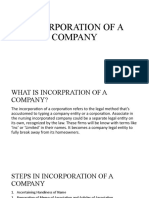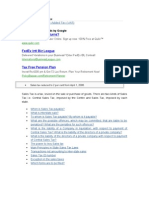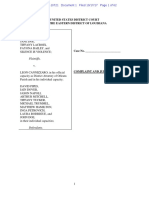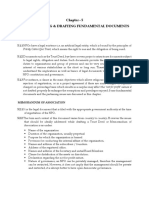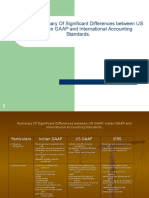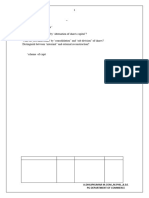DTC Provisions
DTC Provisions
Uploaded by
rajdeeppawarCopyright:
Available Formats
DTC Provisions
DTC Provisions
Uploaded by
rajdeeppawarCopyright
Available Formats
Share this document
Did you find this document useful?
Is this content inappropriate?
Copyright:
Available Formats
DTC Provisions
DTC Provisions
Uploaded by
rajdeeppawarCopyright:
Available Formats
Salient features of Direct Taxes Code Bill, 2010 (DTC 2010)
Page 1 of 3
Salient features of Direct Taxes Code Bill, 2010 (DTC 2010)
Posted In Direct Tax Code | 2 Comments
Shelf CCs and Companies www.harbourassociates.co.za 2010 (DTC 2010) in the Parliament on 30 August 2010 Also Trusts and Incs since 1971 Instant Wills for which is proposed to come into force on 1 April 2012. travellers
The Finance Minister tabled the Direct Taxes Code Bill,
Some of the salient features are outlined below:
Expat Tax Returns Online www.expatriatetaxreturns.com Expat Tax Forms 2555, 1116, 8854 File US Non General Resident Individual Tax
The Code proposes that every person shall be liable to pay income-tax in respect of the total income for the financial year. The concepts of previous year and assessment year are proposed to be done away with. Rates Income Tax Saving Scheme i-save.com/Best-Life-Insurance of tax as applicable to the persons are proposed under a schedule; for companies, individuals etc the Compare life insurance products. Save tax u/s 80C maximum rate of tax is proposed at 30%. Additionally a domestic company would be required to pay a dividend distribution tax (DDT) of 15% on dividends declared, distributed or paid. Minimum Alternate tax (MAT) of 20% would be applicable on a company in case the tax based on the book profits is higher than the tax based on the profits as per the normal tax computation. A foreign company is required to pay an additional branch profits tax of 15% in respect of the branch profits. Levy of surcharge and education cess is proposed to be done away with.
Download - Taxbase www.sinewave.co.in Assists you in filing/efiling and Income Tax computation/management
Residence In the case of a company, it is proposed that the company shall be resident in India if it is an Indian company or if the place of effective management (POEM) is in India. POEM has been defined to mean the place where the board of directors or executive directors make their decisions or the place where such executive directors or officers of the company perform their functions and the board of directors routinely approves the commercial and strategic decisions taken by such executive directors or officers. In all cases, other than an individual, the persons would be a resident in India, if the place of control and management of the affairs, at any time of the year is situated wholly, or partly, in India. Source rules Additional source rules for income arising to a non- resident are proposed to be introduced as income deemed to accrue in India; for e.g. insurance premium including reinsurance covering any risk in India, from the transfer of any share or interest in a foreign company, where the fair market value of the assets in India owned by the company represent at least 50% of the fair market value of all the assets owned by the company etc. Computation of total income Income has been proposed to be classified as income from ordinary sources and income from special sources; Income from ordinary sources would comprise of income from employment, house property, business, capital gains and residuary sources. Income from special sources would refer to specified income of non residents, winning from racehorses, lottery etc. However where the income of a non resident is attributable to a PE, then the same would not be considered as income from special sources.
http://taxguru.in/direct-tax-code/salient-features-of-direct-taxes-code-bill-2010-dtc-2010....
08/08/2011
Salient features of Direct Taxes Code Bill, 2010 (DTC 2010)
Page 2 of 3
Personal taxes Changes in income slabs which will result in incremental savings in tax. The concept of Not ordinarily resident? is removed. The condition of 729 days has been retained to determine the taxability of overseas income of an individual A person not entitled to HRA is allowed a deduction of rent paid upto 10% of GTI or INR 2000 per month & other conditions as may be prescribed Exemption for medical expenses has been increased to INR 50,000. Contribution to approved funds is deductible to the extent of INR 1 lacs. Deduction for insurance premium (not exceed five percent. of the capital sum assured), Health Insurance covered & Tuition fees to the extent of INR 50,000. Wealth tax to be levied at 1% for wealth in excess of INR 10 million Capital gains Income from all investment assets to be computed under the head Capital gains?. Investment asset to include any capital asset which is not a business capital asset, any security held by a Foreign Institutional Investor and any undertaking or division of a business. Distinction between short-term investment asset and long-term investment asset on the basis of the length of holding of the asset to be eliminated. No tax on gains on transfer of shares of a company or unit of equity oriented fund that are held for more than one year and such transfer is chargeable to Securities Transaction Tax (STT). STT would be chargeable on transfer of equity shares of a company or a unit of an equity oriented fund. Fifty percent of the capital gains are allowed as deduction on transfer of shares of a company or unit of equity oriented fund that are held for a period of one year or less and such transfer is chargeable to STT. The base date for determining the cost of acquisition to be shifted from 1 April 1981 to 1 April 2000. Consequently, all unrealized capital gains on assets between 1 April 1981 and 31 March 2000 not to be liable to tax. Cost of acquisition to be Nil, if cannot be determined or ascertained for any reason. Capital loss to be allowed to set off only against capital gains. The capital loss can be carried forward for indefinite period. MAT Computation of book profits broadly similar to existing law Credit for tax paid under DTC 2010, would be available. The credit would be allowed to be carried forward for 15 years. MAT now applicable to SEZ developers and units in an SEZ Tax incentives The DTC 2010 provides for expenditure based incentives wherein capital expenditure incurred by the specified business would be allowed as a deduction. Specified businesses, amongst others would include generation, transmission or distribution of power, developing or operating and maintaining any infrastructure facility, operating a maintaining a hospital in a specified area, SEZ developers and units established in an SEZ, exploration and production of mineral oil or natural gas, setting up and operating a cold chain facility, developing and building a housing project under a scheme of slum redevelopment etc. Grandfathering provisions for SEZ developers and SEZ Units Grandfathering of profit linked incentives under the Income-tax act, 1961 to continue for SEZ developers notified on or before 31 March 2012. In case of SEZ units, the deduction would be permissible for units commencing operations on or before 31 March 2014
http://taxguru.in/direct-tax-code/salient-features-of-direct-taxes-code-bill-2010-dtc-2010....
08/08/2011
Salient features of Direct Taxes Code Bill, 2010 (DTC 2010)
Page 3 of 3
Anti- abuse provisions General anti-avoidance rules The characteristics of the originally proposed rules have been retained. Additionally it is proposed that an arrangement would be presumed for obtaining a tax benefit would include reduction in tax base including increase in losses. The provisions would be applicable as per the guidelines to be framed by the Central Government. Further the definition of lacking commercial substance has been amended to clarify that obtaining tax benefit cannot be the only criteria for applicability of GAAR. Controlled foreign company (CFC) rules: As indicated in the revised discussion draft, CFC rules have been incorporated to provide for the taxation of income attributable to a CFC to be taxed in the hands of the resident. A foreign company would be considered as a CFC which for the purposes of tax is a resident of a country or territory with a lower rate of tax the shares of the company are not traded on any stock exchange one or more persons individually or collectively exercise control over the company it is not engaged in any active trade or business the specified income exceed INR 2.5 million.
Rules pertaining to the computation of the income attributable to the CFC which would be required to be added to the income of the resident have been provided. Tax treaty provisions It has been proposed to revert to the provisions under the existing law, wherein the provisions of the Code shall apply in relation to an assessee to whom the agreement applies, to the extent they are more beneficial. However, the provisions relating to GAAR, CFC and Branch profit tax would continue to apply irrespective of the beneficial provisions of the tax treaty provisions. It has also been proposed that a person shall be entitled to claim relief under the provisions of the agreement on production of a certificate in the prescribed form, from the tax authorities of the country that such person is a resident of the country. A resident in India would be entitled to claim credit of taxes paid or deducted at source in the country in accordance with the provisions of the tax treaty against the income tax payable in respect of the income for the financial year. Where tax has been paid or deducted in a country with which there exists no agreement credit can be claimed only at the lower of the rate of tax under the DTC 2010 and the tax rate levied in the other country. However, the credit cannot exceed the tax payable under the DTC 2010. Source: Direct Taxes Code Bill 2010 tabled on 30 August 2010 in the Lok Sabha.
http://taxguru.in/direct-tax-code/salient-features-of-direct-taxes-code-bill-2010-dtc-2010....
08/08/2011
You might also like
- Go Karting Business PlanDocument9 pagesGo Karting Business PlanRaghav100% (1)
- Articles of Incorporation - OregonDocument4 pagesArticles of Incorporation - OregonjohnhickernellNo ratings yet
- Exam FM: You Have What It Takes To PassDocument5 pagesExam FM: You Have What It Takes To Passenquiry no100% (2)
- NISM Series XIV Internal Auditors For Stock Brokers December 2018 PDFDocument249 pagesNISM Series XIV Internal Auditors For Stock Brokers December 2018 PDFTHONANGI DHEERAJNo ratings yet
- Registration Procedure Under Central Sales Act (SectionDocument23 pagesRegistration Procedure Under Central Sales Act (SectionkgudiyaNo ratings yet
- Advanced Tax Laws CS Professional, YES AcademyDocument33 pagesAdvanced Tax Laws CS Professional, YES AcademyKaran AroraNo ratings yet
- The Corporation Code of The Philippines B.P. Blg. 68: Lecture 3 (Parts 1 and 2) June 22, 2011Document86 pagesThe Corporation Code of The Philippines B.P. Blg. 68: Lecture 3 (Parts 1 and 2) June 22, 2011MaanParrenoVillarNo ratings yet
- M4S2 How To Build fi-WPS OfficeDocument5 pagesM4S2 How To Build fi-WPS OfficeSatyanarayan DwivediNo ratings yet
- Companies Law: Presented by Deepshikha Meeta Nikita ShivaniDocument63 pagesCompanies Law: Presented by Deepshikha Meeta Nikita ShivaniSahil SherasiyaNo ratings yet
- Financial Leverage Ratios, Sometimes Called Equity or Debt Ratios, MeasureDocument11 pagesFinancial Leverage Ratios, Sometimes Called Equity or Debt Ratios, MeasureBonDocEldRicNo ratings yet
- The Consumer Protection Act Was Implemented in Order To Provide Better Protection To The Rights of The ConsumersDocument15 pagesThe Consumer Protection Act Was Implemented in Order To Provide Better Protection To The Rights of The ConsumersSuraj DewasiNo ratings yet
- Monograph 8 Felony Sentencing Appendices April-2009Document160 pagesMonograph 8 Felony Sentencing Appendices April-2009Mark JacksonNo ratings yet
- 6 Clauses of The Memorandum of Association Under Section 13 of Companies ActDocument4 pages6 Clauses of The Memorandum of Association Under Section 13 of Companies ActgautamNo ratings yet
- Incorporation of A Company Business LawDocument12 pagesIncorporation of A Company Business LawRiya Aggarwal100% (1)
- Sales Tax GuideDocument6 pagesSales Tax GuideakhileshkantNo ratings yet
- Income Tax PresentationDocument22 pagesIncome Tax PresentationItchigo KorusakiNo ratings yet
- Corporate Bylaws FormDocument12 pagesCorporate Bylaws FormYong Loon NgNo ratings yet
- 09 Directors - Company Secretary and AuditorsDocument10 pages09 Directors - Company Secretary and AuditorsKevin KausiyoNo ratings yet
- Project On Corporate GovernanceDocument22 pagesProject On Corporate GovernancePallavi PradhanNo ratings yet
- Public and Private CompanyDocument3 pagesPublic and Private CompanyGarima GarimaNo ratings yet
- The 4 Major Business Organization FormsDocument3 pagesThe 4 Major Business Organization FormsRemo Task RivbNo ratings yet
- Index: 2. Memorandum of Company 3. Steps in Incorporation of A Company 4. Certificate of Incorporation 5. ConclusionDocument8 pagesIndex: 2. Memorandum of Company 3. Steps in Incorporation of A Company 4. Certificate of Incorporation 5. ConclusionSahil SaharanNo ratings yet
- PPTXDocument140 pagesPPTXGuinevereNo ratings yet
- ATL Logistics Broker Carrier AggreementDocument6 pagesATL Logistics Broker Carrier AggreementAnusha100% (1)
- Consumer Protection ActDocument19 pagesConsumer Protection ActAvani ShahNo ratings yet
- 3 Company LawDocument23 pages3 Company LawasifmajeddharoonNo ratings yet
- Singleton v. Cannizzaro FILED 10 17 17Document62 pagesSingleton v. Cannizzaro FILED 10 17 17Monique Judge100% (1)
- Nature and Formation of A CompanyDocument15 pagesNature and Formation of A CompanyCOLLINS MWANGI NJOROGENo ratings yet
- Chapter-5-Drafting Fundamental Documents PDFDocument4 pagesChapter-5-Drafting Fundamental Documents PDFShubham AgarwalNo ratings yet
- BylawsDocument11 pagesBylawsPrabakaran MuniandyNo ratings yet
- Consumerism: Presented ByDocument18 pagesConsumerism: Presented ByMadhupriya SinghNo ratings yet
- 6665corporate Laws Manual Final 2021Document354 pages6665corporate Laws Manual Final 2021lekhonNo ratings yet
- Principles of Operation and ManagementfinalDocument15 pagesPrinciples of Operation and ManagementfinalK58 Đặng Thành VinhNo ratings yet
- Legal Aspects of Business Unit 4 Ms Neha RaniDocument123 pagesLegal Aspects of Business Unit 4 Ms Neha Ranihari haranNo ratings yet
- Accounting ProcessDocument79 pagesAccounting ProcessKeanna Ashley GutingNo ratings yet
- Holding CompanyDocument16 pagesHolding CompanyNguyen HungNo ratings yet
- Cash Control GuidelinesDocument4 pagesCash Control GuidelinesEsmeldo MicasNo ratings yet
- Joint Stock CompanyDocument40 pagesJoint Stock Companyarun447No ratings yet
- ACCOUNTING FOR CORPORATES (BBBH233) - 001 Module 1 - 1573561029351Document66 pagesACCOUNTING FOR CORPORATES (BBBH233) - 001 Module 1 - 1573561029351Harshit Kumar GuptaNo ratings yet
- NOTES For Intermediate AccountingDocument50 pagesNOTES For Intermediate AccountingCezanne EckmanNo ratings yet
- Tax Obligations For Individuals and CorporDocument4 pagesTax Obligations For Individuals and Corporgabriel6lambokNo ratings yet
- Admin ProjectDocument17 pagesAdmin ProjectScheherazade SandhuNo ratings yet
- ItemizedDocument7 pagesItemizedzel100% (1)
- INTRODUCTION TO CORPORATE GOVERNANCE Law NotesDocument11 pagesINTRODUCTION TO CORPORATE GOVERNANCE Law Notesjoseph mbuguaNo ratings yet
- Leg ProfDocument16 pagesLeg ProfcelNo ratings yet
- Chapter 6 - Income TaxDocument12 pagesChapter 6 - Income TaxlovelyrichNo ratings yet
- Doctrine of Ultra ViresDocument2 pagesDoctrine of Ultra ViresTony Davis0% (1)
- Slump Sale: /Referencer2015-16/Other Laws/Company Law/slump - Sale - HTMDocument2 pagesSlump Sale: /Referencer2015-16/Other Laws/Company Law/slump - Sale - HTMRakeshNo ratings yet
- Company Law FoundationDocument17 pagesCompany Law FoundationVanshika chalwaNo ratings yet
- Business Organization and ManagementDocument29 pagesBusiness Organization and ManagementErikaaa QtNo ratings yet
- Financial Institutions in The Financial SystemDocument15 pagesFinancial Institutions in The Financial SystemNigussie Berhanu100% (1)
- The Role of Accounting in BusinessDocument18 pagesThe Role of Accounting in BusinessJawad AzizNo ratings yet
- Accounting BasicsDocument42 pagesAccounting Basicssowmithra4uNo ratings yet
- Corporate Leagal Framework 3Document553 pagesCorporate Leagal Framework 3Gurpreet SainiNo ratings yet
- Chapter 2 - Corporate Formations and Capital StructureDocument17 pagesChapter 2 - Corporate Formations and Capital StructuresegajayNo ratings yet
- From An Employee To A SelfDocument3 pagesFrom An Employee To A SelfChristine BobisNo ratings yet
- Legal Writng Atty. Alejandria Sept. 14,2016Document4 pagesLegal Writng Atty. Alejandria Sept. 14,2016Anonymous IJah4mNo ratings yet
- The Company Act, 1956 PDFDocument34 pagesThe Company Act, 1956 PDFSahitya SoniNo ratings yet
- Accounting System 2Document67 pagesAccounting System 2Kristine ArsolonNo ratings yet
- Strategic Tax Management - Week 2Document44 pagesStrategic Tax Management - Week 2Arman DalisayNo ratings yet
- Deductions From Gross IncomeDocument2 pagesDeductions From Gross Incomericamae saladagaNo ratings yet
- Generally Accepted Accounting Principles A Complete Guide - 2020 EditionFrom EverandGenerally Accepted Accounting Principles A Complete Guide - 2020 EditionNo ratings yet
- Intellectual Property Operations and Implementation in the 21st Century CorporationFrom EverandIntellectual Property Operations and Implementation in the 21st Century CorporationNo ratings yet
- SCS 2007 11Document46 pagesSCS 2007 11rajdeeppawarNo ratings yet
- SCS 2006 02Document40 pagesSCS 2006 02rajdeeppawarNo ratings yet
- SCS 2007 02Document29 pagesSCS 2007 02rajdeeppawarNo ratings yet
- Diff Bet USGAAP IGAAP IFRSDocument7 pagesDiff Bet USGAAP IGAAP IFRSrajdeeppawarNo ratings yet
- NOTE: Answer SIX Questions Including Question No.1 Which Is CompulsoryDocument4 pagesNOTE: Answer SIX Questions Including Question No.1 Which Is CompulsoryrajdeeppawarNo ratings yet
- Roll No : Part - ADocument5 pagesRoll No : Part - ArajdeeppawarNo ratings yet
- NOTE: Answer SIX Questions Including Question No.1 Which Is CompulsoryDocument3 pagesNOTE: Answer SIX Questions Including Question No.1 Which Is CompulsoryrajdeeppawarNo ratings yet
- NOTE: Answer SIX Questions Including Question No.1 Which Is CompulsoryDocument3 pagesNOTE: Answer SIX Questions Including Question No.1 Which Is CompulsoryrajdeeppawarNo ratings yet
- Cost Accounting Standards at A GlanceDocument10 pagesCost Accounting Standards at A GlancerajdeeppawarNo ratings yet
- Exam Centre Node CentreDocument17 pagesExam Centre Node CentrerajdeeppawarNo ratings yet
- Statutory Due Date For F y 15 16Document1 pageStatutory Due Date For F y 15 16rajdeeppawarNo ratings yet
- TCODE - OKP1 - Period - Lock - UnlockDocument3 pagesTCODE - OKP1 - Period - Lock - UnlockrajdeeppawarNo ratings yet
- Story On DT Case Law Nov.13: Amit JainDocument3 pagesStory On DT Case Law Nov.13: Amit JainrajdeeppawarNo ratings yet
- TCODE - S - ALR - 87012050 Asset Aquisitions ListDocument3 pagesTCODE - S - ALR - 87012050 Asset Aquisitions ListrajdeeppawarNo ratings yet
- TCODE - S - ALR - 87005722 Maintain Plan VersionDocument4 pagesTCODE - S - ALR - 87005722 Maintain Plan VersionrajdeeppawarNo ratings yet
- TCODE - MIRO Enter Vendor InvoiceDocument8 pagesTCODE - MIRO Enter Vendor InvoicerajdeeppawarNo ratings yet
- TCODE - S - ALR - 87011994 Asset Balances ReportDocument5 pagesTCODE - S - ALR - 87011994 Asset Balances ReportrajdeeppawarNo ratings yet
- TCODE - S - ALR - 87012052 Asset RetirementsDocument3 pagesTCODE - S - ALR - 87012052 Asset RetirementsrajdeeppawarNo ratings yet
- TCODE - S - ALR - 87013099 Order Plan - Actual ComparisonDocument4 pagesTCODE - S - ALR - 87013099 Order Plan - Actual ComparisonrajdeeppawarNo ratings yet
- TCODE - KSVB - Execute - Plan - Cost - DistributionDocument5 pagesTCODE - KSVB - Execute - Plan - Cost - DistributionrajdeeppawarNo ratings yet
- TCODE - S - ALR - 87013127 List of OrdersDocument5 pagesTCODE - S - ALR - 87013127 List of OrdersrajdeeppawarNo ratings yet
- TCODE - S - ALR - 87013180 Listing of Materials by Period StatusDocument4 pagesTCODE - S - ALR - 87013180 Listing of Materials by Period StatusrajdeeppawarNo ratings yet
- STR 581 Capstone Final Exam Part Two Latest Question AnswersDocument12 pagesSTR 581 Capstone Final Exam Part Two Latest Question AnswersaarenaddisonNo ratings yet
- Chapters 20, 22 & 24Document59 pagesChapters 20, 22 & 24Manidipa BoseNo ratings yet
- 04G - Group 18 - Business PlanDocument40 pages04G - Group 18 - Business Plannur aisyahNo ratings yet
- 5.2 Money 5Document13 pages5.2 Money 5clinton fifantyNo ratings yet
- 2023 04 12 RAIB - Ns HSBC Rainbow Children - S Medicare (RAINBOW In) Initiate at Buy T... 101378008Document47 pages2023 04 12 RAIB - Ns HSBC Rainbow Children - S Medicare (RAINBOW In) Initiate at Buy T... 101378008Vikram SharmaNo ratings yet
- Overview - Corp. Valuation (14.9.2023)Document15 pagesOverview - Corp. Valuation (14.9.2023)Sonali MoreNo ratings yet
- Business Important Topics and Question by SimranDocument27 pagesBusiness Important Topics and Question by SimranSimran KaurNo ratings yet
- MAT112 - Past Year Instalment PurchaseDocument4 pagesMAT112 - Past Year Instalment Purchaseatiqahcantik100% (2)
- A Research Project On Impact of FII: On Money MarketDocument9 pagesA Research Project On Impact of FII: On Money Marketsamruddhi_khaleNo ratings yet
- S 9 - Capital Investment DecisionDocument24 pagesS 9 - Capital Investment DecisionAninda DuttaNo ratings yet
- Advanced Corporate Accounting-II 2Document32 pagesAdvanced Corporate Accounting-II 2d.vigneshvicky2004No ratings yet
- Chapter-10 Market Risk Math Problems and SolutionsDocument6 pagesChapter-10 Market Risk Math Problems and SolutionsruponNo ratings yet
- Informal Risk and Venture CapitalDocument15 pagesInformal Risk and Venture CapitalZoofi ShanNo ratings yet
- Math TestDocument2 pagesMath Testkhushisheoran1No ratings yet
- CA Final Audit Book (May & Nov 23 Attempt) Volume 2Document487 pagesCA Final Audit Book (May & Nov 23 Attempt) Volume 2Nishu KumarNo ratings yet
- Incentives and SubsidiesDocument11 pagesIncentives and Subsidiesvignesh1988457% (7)
- Practice Tests Government Grant EtcDocument10 pagesPractice Tests Government Grant EtcgnlynNo ratings yet
- Capital Adequacy Ratio IntroductionDocument9 pagesCapital Adequacy Ratio IntroductionShubham PhophaliaNo ratings yet
- Shrieves Casting Company Is Considering Adding A New Line ToDocument3 pagesShrieves Casting Company Is Considering Adding A New Line ToAmit PandeyNo ratings yet
- Antony's Working Cap - MGMT CPCLDocument88 pagesAntony's Working Cap - MGMT CPCLDamodharan RathanaveluNo ratings yet
- Chapter 03 - Non-Bank Financial InstitutionsDocument18 pagesChapter 03 - Non-Bank Financial InstitutionsKhang Tran DuyNo ratings yet
- Bank Confirmation FormatDocument4 pagesBank Confirmation FormatTasdik Mahmud100% (1)
- Valuing Contingent Consideration Using Option Pricing PDFDocument16 pagesValuing Contingent Consideration Using Option Pricing PDFOmer LandauNo ratings yet
- Plated FinalpaperDocument36 pagesPlated Finalpaperapi-300760395No ratings yet
- McKinsey - Avoiding The Quicksand - Ten Techniques For More Agile Corporate Resource AllocationDocument7 pagesMcKinsey - Avoiding The Quicksand - Ten Techniques For More Agile Corporate Resource Allocationumuttk5374No ratings yet
- Stiffany and Co QuestionsDocument1 pageStiffany and Co QuestionsAli Zaigham AghaNo ratings yet
- Dividend PolicyDocument34 pagesDividend Policyaditi anandNo ratings yet













